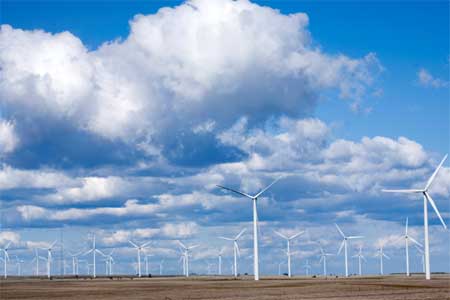However, because it was intended only as a stopgap economic stimulus, the window to qualify for the funds is fast closing. Construction must begin by the end of 2010 with at least 5% of total capital costs spent by the end of the year. The projects must then complete construction by the end of 2012 to be eligible for the completion grant.
In the waning days of December 2009's congressional session, US senators Dianne Feinstein of California and Jeff Merkley of Oregon introduced a bill to extend the deadline to start construction from 2010 to 2012, saying the financial markets have not recovered enough to sufficiently support the wind market. The main wind power incentive prior to the grants was the production tax credit, which also offset around 30% of the capital cost of wind stations, but which typically requires developers to enter into complex partnerships with firms with high tax bills.
"The grant programme is set to expire at the end of 2010 before most construction is expected to occur and well before experts expect the tax equity markets to thaw," says Feinstein. "If the grant programme is not extended, bank profits will again become the limiting factor on renewable energy development in the United States, and that makes no sense."
Wind industry insiders say the effort towards passing the extension is picking up but is far from a certainty. "I think there is certainly a viability for an extension but, again, it's something that Congress has to make a determination on and they may need more time to see how the grant programme is working to decide whether it's in the public policy interest," says Liz Salerno, policy analyst for the American Wind Energy Association. During an election year, lawmakers may be torn between supporting renewables and concern over government spending. There may also be a renewed attack from the protectionist buy American lobby, as most grant recipients so far have been foreign wind companies.
Greg Jenner, partner at law firm Stoel Rives, says an extension for the grants and a separate bonus depreciation credit could be passed in Congress. "I wouldn't be surprised if we saw something at year end but it's going to be something last minute," he says. "There's a strong feeling in Congress that we're not out of the recession even though, technically, we may be."
Wind developers are reluctant to let go of a lifeline that has sustained them over the past year. "The stimulus funding has helped tremendously," says Jan Johnson, spokeswoman for Iberdrola Renewables in the US. "We had our biggest year ever in 2008 like most people - $2 billion of investment in wind power - and then with the collapse of the financial markets we were very concerned we were going to have to cut our build plan in half in 2009. It didn't have to be. We could keep going thanks to the stimulus funding, and we're very optimistic for 2010 too. So it was a huge boost, really critical to us," says Johnson. If an extension is passed, she says, "it would definitely impact upon turbine orders and construction plans".

.png)

.png)











